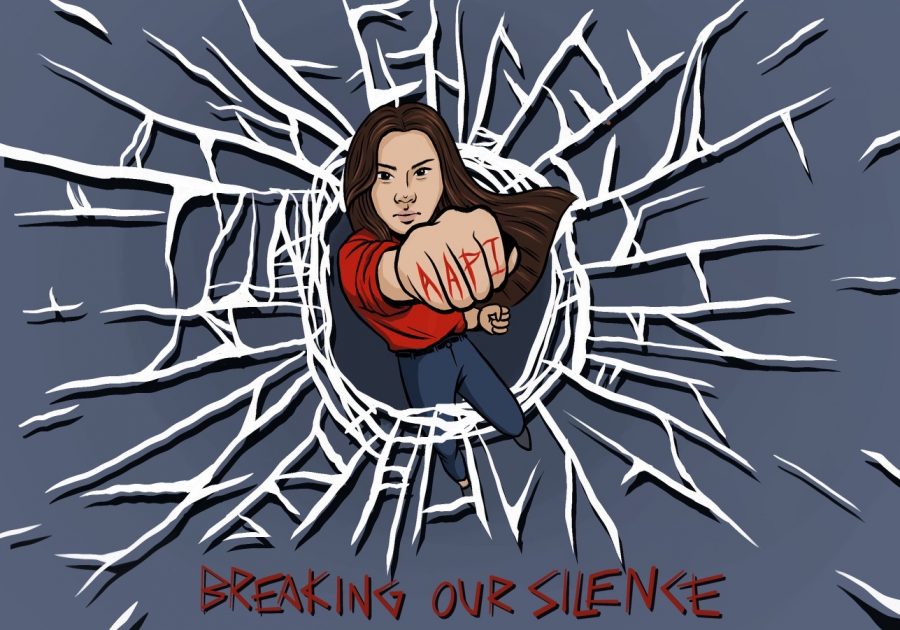Editorial: End the invisibility of anti-Asian American violence
After year of hate crimes, mass shootings in Atlanta create breaking point
The Atlanta shootings opened a floodgate of fear for Asian Americans around the country and in our school community. We refuse to be reserved about hate crimes against the AAPI community.
March 31, 2021
In a survey sent out to members of the Harker Journalism news staff, 100% of the 29 respondees indicated that they agreed with the stance of this editorial.
Soon Chung Park. Hyun Jung Grant. Suncha Kim. Yong Ae Yue. Xiaojie Tan. Daoyou Feng. Delaina Ashley Yaun. Paul Andre Michels. They were not nameless vessels to carry the fatal burden of a shooter’s “bad day.” They were mothers, grandmothers, immigrants, business owners.
And yet, their names remained unknown for days after the shooting, and most information about the women comes from relatives’ GoFundMe pages and sparse news articles.
Instead, the media delved into the life of the killer who murdered eight people at three massage parlors in Atlanta on March 16, six of whom were Asian women. We knew his church and stories from his childhood before we knew the names of those he killed. Deputy Jay Baker of the Cherokee County Sheriff’s office excused the white gunman, stating that he was “at the end of his rope” after a “bad day.” News outlets took the shooter’s words at face value, magnifying his narrative of “sex addiction” with the power of the press. This fascination with the shooter’s identity disregards the eight families mourning their loved ones and distracts from the deep uncertainty of the Asian American community following the shootings. It humanizes the shooter and dehumanizes the victims.
If we don’t know the stories of those who died, we let them become ‘others,’ eliminating their agency to make the victims unknowable stereotypes: the quiet, submissive and yet sexualized Asian woman.
The shootings in Atlanta reveal a knotted intersection of punishing women for a gunman’s wrongs and the specific experiences of Asian American women. Killing Asian women by reducing them to objects reveals a historical continuity dating back to the beginning of Asian immigration to America.
In 1875 Congress passed the Page Act, strategically barring all Chinese women from immigrating to the United States under the guise of protecting the U.S. from prostitutes. A century later, the Vietnam War led to the American military’s heavy solicitation of sex workers near base camps, further propogating the stereotype of Asian women as exotic, submissive objects to be used for pleasure.
This stereotype found a larger audience on the silver screen, in media such as Stanley Kubrick’s “Full Metal Jacket” (1987), which portrayed Vietnamese women as sex workers speaking broken English, and Miss Saigon (1989), where an American G.I. sexually abuses the Vietnamese female lead.
Women reported around 70% of the 3,795 hate incidents recorded by Stop AAPI Hate, a nonprofit organization that provides a platform for tracking the violence. Over the past year, verbal and physical assaults against Asian Americans, especially the elderly, increased as a result of conflating Asian descent with the COVID-19 pandemic. Terms such as “Chinese virus” or “kung flu” used by figures of authority, including the former president, reignited centuries-long xenophobia against Asians.
We stand in solidarity with our Asian American and Pacific Islander community, who make up over two-thirds of our student body.
Historical policies feed into the portrayal of Asian Americans as the perpetual foreigner, from the Chinese Exclusion Act of 1882, which ended Chinese immigration until World War II, to the 120,000 Japanese Americans sent to internment camps, some of whom permanently lost their property and businesses. In 1982, two white men beat Chinese American Vincent Chin over dissatisfaction with the auto industry. He died on what would have been his wedding day.
However, these acts of discrimination went mostly without reparations until the Civil Liberties Act of 1988. By that time, many sent to the internment camps had died. A judge sent off Chin’s murderers with fines and no jail time, explaining that “these aren’t the kind of men you send to jail.”
The Atlanta shootings opened a floodgate of fear for Asian Americans around the country and in our school community. Our students shoulder the heightened possibility of becoming a victim of these hate crimes. A veil of fear masks mundane tasks, such as walking alone or going to the grocery store. Leaving parents and grandparents unattended in public raises even greater uncertainty.
Being Asian American in America has often meant invisible stories of pain, with experiences amalgamated into a “model minority” stereotype of academic and economic success. However, our experiences encompass the stories of immigrants, including economic struggles and language barriers.
We refuse to be reserved about hate crimes against the AAPI community. Attend #StopAsianHate rallies to advocate for the AAPI community, as members or as allies. If you are Asian American, discuss your safety concerns with parents and trusted adults and share your fears.
We are at the end of our rope.


















![“[Building nerf blasters] became this outlet of creativity for me that hasn't been matched by anything else. The process [of] making a build complete to your desire is such a painstakingly difficult process, but I've had to learn from [the skills needed from] soldering to proper painting. There's so many different options for everything, if you think about it, it exists. The best part is [that] if it doesn't exist, you can build it yourself," Ishaan Parate said.](https://harkeraquila.com/wp-content/uploads/2022/08/DSC_8149-900x604.jpg)




![“When I came into high school, I was ready to be a follower. But DECA was a game changer for me. It helped me overcome my fear of public speaking, and it's played such a major role in who I've become today. To be able to successfully lead a chapter of 150 students, an officer team and be one of the upperclassmen I once really admired is something I'm [really] proud of,” Anvitha Tummala ('21) said.](https://harkeraquila.com/wp-content/uploads/2021/07/Screen-Shot-2021-07-25-at-9.50.05-AM-900x594.png)







![“I think getting up in the morning and having a sense of purpose [is exciting]. I think without a certain amount of drive, life is kind of obsolete and mundane, and I think having that every single day is what makes each day unique and kind of makes life exciting,” Neymika Jain (12) said.](https://harkeraquila.com/wp-content/uploads/2017/06/Screen-Shot-2017-06-03-at-4.54.16-PM.png)








![“My slogan is ‘slow feet, don’t eat, and I’m hungry.’ You need to run fast to get where you are–you aren't going to get those championships if you aren't fast,” Angel Cervantes (12) said. “I want to do well in school on my tests and in track and win championships for my team. I live by that, [and] I can do that anywhere: in the classroom or on the field.”](https://harkeraquila.com/wp-content/uploads/2018/06/DSC5146-900x601.jpg)
![“[Volleyball has] taught me how to fall correctly, and another thing it taught is that you don’t have to be the best at something to be good at it. If you just hit the ball in a smart way, then it still scores points and you’re good at it. You could be a background player and still make a much bigger impact on the team than you would think,” Anya Gert (’20) said.](https://harkeraquila.com/wp-content/uploads/2020/06/AnnaGert_JinTuan_HoHPhotoEdited-600x900.jpeg)

![“I'm not nearly there yet, but [my confidence has] definitely been getting better since I was pretty shy and timid coming into Harker my freshman year. I know that there's a lot of people that are really confident in what they do, and I really admire them. Everyone's so driven and that has really pushed me to kind of try to find my own place in high school and be more confident,” Alyssa Huang (’20) said.](https://harkeraquila.com/wp-content/uploads/2020/06/AlyssaHuang_EmilyChen_HoHPhoto-900x749.jpeg)








